Cnl 500 topic 1 dq 1 - Study guides, Class notes & Summaries
Looking for the best study guides, study notes and summaries about Cnl 500 topic 1 dq 1? On this page you'll find 20 study documents about Cnl 500 topic 1 dq 1.
Page 2 out of 20 results
Sort by
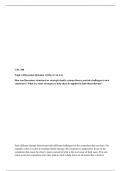
-
CNL 500 Topic 6 Discussion Question 1 (Obj. 6.1, and 6.4)
- Other • 2 pages • 2023
- Available in package deal
-
- $9.99
- + learn more
CNL 500 (Theories and Models of Counseling) Topic 6 Discussion Question 1 (Obj. 6.1, and 6.4) Description: How can Bowenian, structural or strategic family systems theory provide challenges to new counselors? What are some strategies to help them be applied in individual therapy?
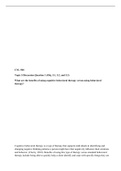
-
CNL 500 Topic 5 Discussion Question 1 (Obj. 5.1, 5.2, and 5.3)
- Other • 2 pages • 2023
- Available in package deal
-
- $9.99
- + learn more
What are the benefits of using cognitive behavioral therapy versus using behavioral therapy?
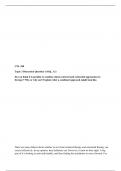
-
CNL 500 Topic 3 Discussion Question 1 (Obj. 3.1)
- Other • 2 pages • 2023
- Available in package deal
-
- $9.99
- + learn more
CNL 500 (Theories and Models of Counseling) Topic 3 Discussion Question 1 (Obj. 3.1) Description: Do you think it is possible to combine client-centered and existential approaches in therapy? Why or why not? Explain what a combined approach might look like.
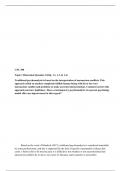
-
CNL 500 Topic 1 Discussion Question 2 (Obj. 1.1, 1.3, & 1.4)
- Other • 2 pages • 2023
- Available in package deal
-
- $9.99
- + learn more
CNL 500 (Theories and Models of Counseling) Topic 1 Discussion Question 2 (Obj. 1.1, 1.3, and 1.4) Description: Traditional psychoanalysis is based on the interpretation of unconscious conflicts. This approach relied on another completely fallible human being with his or her own unconscious conflict and problems to make accurate interpretations. Comment on how this approach can have legitimacy. Does a contemporary psychoanalytic two-person psychology model offer any improvement in this reg...
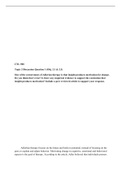
-
CNL 500 Topic 2 Discussion Question 1 (Obj. 2.1, and 2.3)
- Other • 2 pages • 2023
- Available in package deal
-
- $10.49
- + learn more
CNL 500 (Theories and Models of Counseling) Topic 2 Discussion Question 1 (Obj. 2.1, and 2.3) Description: One of the cornerstones of Adlerian therapy is that insight produces motivation for change. Do you think that’s true? Is there any empirical evidence to support the contention that insight produces motivation? Include a peer reviewed article to support your response.
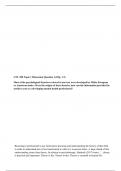
-
CNL 500 Topic 1 Discussion Question 1 (Obj. 1.3)
- Other • 2 pages • 2023
- Available in package deal
-
- $9.99
- + learn more
CNL 500 (Theories and Models of Counseling) Topic 1 Discussion Question 1 (Obj. 1.3) Description: Most of the psychological theories reviewed in our text were developed by White European or American males. Given the origins of these theories, how can the information provided be useful to you as a developing mental health professional?
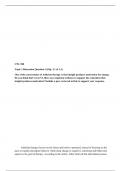
-
CNL 500 Topic 2 Discussion Question 1 (Obj. 2.1, and 2.3)
- Other • 2 pages • 2023
- Available in package deal
-
- $9.99
- + learn more
CNL 500 (Theories and Models of Counseling) Topic 2 Discussion Question 1 (Obj. 2.1, and 2.3) Description: One of the cornerstones of Adlerian therapy is that insight produces motivation for change. Do you think that’s true? Is there any empirical evidence to support the contention that insight produces motivation? Include a peer-reviewed article to support your response.

-
CNL 500 Topic 1 Discussion Question 1 (Obj. 1.3)
- Other • 2 pages • 2023
- Available in package deal
-
- $10.49
- + learn more
CNL 500 (Theories and Models of Counseling) Topic 1 Discussion Question 1 (Obj. 1.3) Description: Most of the psychological theories reviewed in our text were developed by White European or American males. Given the origins of these theories, how can the information provided be useful to you as a developing mental health professional?
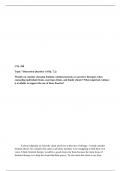
-
CNL 500 Topic 7 Discussion Question 1 (Obj. 7.2)
- Other • 2 pages • 2023
- Available in package deal
-
- $9.99
- + learn more
CNL 500 (Theories and Models of Counseling) Topic 7 Discussion Question 1 (Obj. 7.2) Description: Would you consider choosing feminist, solution-focused, or narrative therapies when counseling individual clients, marriage clients, and family clients? What empirical evidence is available to support the use of these theories?
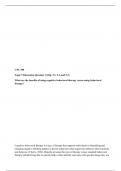
-
CNL 500 Topic 5 Discussion Question 1 (Obj. 5.1, 5.2, and 5.3)
- Other • 2 pages • 2023
- Available in package deal
-
- $9.99
- + learn more
What are the benefits of using cognitive behavioral therapy versus using behavioral therapy?

How much did you already spend on Stuvia? Imagine there are plenty more of you out there paying for study notes, but this time YOU are the seller. Ka-ching! Discover all about earning on Stuvia


